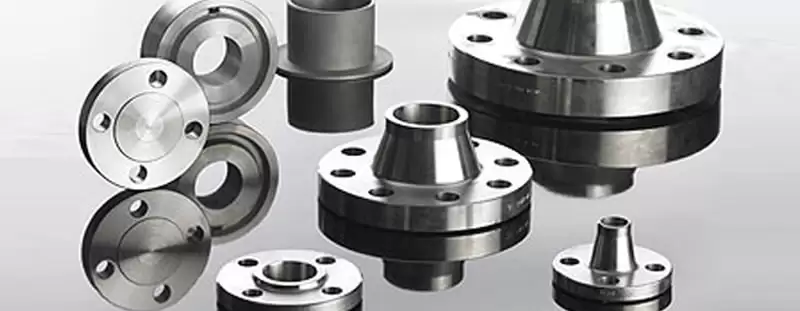In industries where chemical exposure, saltwater exposure or high heat is prevalent, regular metal parts tend to fail. That is not the case for Inconel Flanges. With their outstanding corrosion, and oxidation resistance, these flanges work well in some of the most difficult operating environments. From offshore oil platforms to chemical facilities, their endurance, and strength ensure that safe, and effective systems are operating.
This blog discusses Inconel Flanges, their key advantages, how they function in corrosive situations and where they are most commonly used. By the end, you’ll realize why they’ve become the top choice for challenging industrial applications.
What are Inconel Flanges?
Inconel Flanges are pipe fitting components constructed from Inconel, which is a nickel-chromium-based superalloy known for its outstanding strength, corrosion resistance and durability in extreme temperatures. Inconel Flanges connect pipes, valves, pumps, and other equipment together in systems under high pressure or high temperature. Their chemical composition, which includes nickel, chromium, and traces of iron and molybdenum, allows them to survive corrosion and remain stable under adverse conditions. Due to these qualities, Inconel Flanges are widely used in marine engineering, chemical processing, power generating, and aerospace industries, where other metals corrode, distort, and fail when stressed.
Key Benefits of Using Inconel Flanges
Exceptional Corrosion Resistance
The key advantage of using Inconel Flanges is their corrosion resistance. In contrast to stainless steel or carbon steel, Inconel develops a stable oxide layer on its surface when it gets exposed to oxygen. This layer shields the underlying metal from additional attack. In acid-containing, alkali-containing and saltwater-containing environments, this feature prevents rusting, pitting, and crevice corrosion. Inconel Flanges are not affected even by prolonged exposure to aggressive chemicals, and hence are perfect for chemical plants and marine environments where corrosion is always a constant threat.
High Strength at Elevated Temperatures
Even at temperatures above 1000°C, Inconel Flanges maintain their mechanical qualities, unlike many other materials that weaken when heated. Due to its heat resistance, Inconel finds extensive application in heat exchangers, turbines and exhaust systems. The alloy is perfect for high-pressure activities in power plants or oil refineries due to its resistance to deformation under stress. Under temperature stress, Inconel Flanges maintain their strength and stability, ensuring uninterrupted and safe operation, whereas other metals may soften or deform.
Resistance to Oxidation and Scaling
In high-temperature environments, metals tend to react with oxygen to create scale or oxide layers that impair the surface strength. The special chemical composition of Inconel prevents it from oxidizing even at very high temperatures. Inconel Flanges thus survive both oxidizing, and reducing conditions without weakening or developing harmful layers. This is particularly useful in uses such as gas turbines, or heat treatment systems, where oxidation can reduce the metal part lifespan.
Excellent performance in seawater and marine conditions
Saltwater is one of the most corrosive natural conditions, and few metals can survive for long. In contrast, Inconel Flanges are extremely resistant to chloride-induced corrosion and stress cracking. This makes them suitable for offshore drilling, desalination plants, and shipbuilding. Even when immersed for extended periods of time, Inconel retains its strength and structure. This reliability reduces maintenance costs and provides a long service life for vital marine systems.
Compatibility with Harsh Chemicals
Inconel Flanges perform well in systems that handle sulfuric acid, hydrochloric acid or other aggressive chemicals. Their resistance to attack from both oxidizing and reducing acids makes them superior to most stainless steels. This makes them perfect for chemical processing equipment, reactors and acid-handling systems. With the use of Inconel Flanges, industries can prevent constant replacement, enhance safety, and continue to operate at peak efficiency even in extremely corrosive chemical environments.
Long Service Life and Cost Efficiency
While Inconel Flanges may cost more upfront than standard stainless steel, their long-term performance offers better value. Their durability reduces downtime, maintenance, and replacement costs over time. Since these flanges last for years in corrosive or high-temperature environments, they minimize system failures and extend the overall lifespan of piping networks. For industries that value reliability and safety, this cost efficiency makes Inconel an excellent investment.
Common Industrial Applications
Because of their superior resistance to corrosion, heat, and pressure, Inconel Flanges are widely used in several industries:
- Oil and Gas Industry: For offshore drilling platforms, refineries, and pipelines.
- Chemical Processing Plants: In reactors, evaporators, and acid-handling systems.
- Power Generation: In steam turbines, heat exchangers, and boiler systems.
- Marine Engineering: For shipbuilding, underwater pipelines, and desalination plants.
- Aerospace Industry: In jet engines, exhaust systems, and heat shields.
These applications show how adaptable and reliable Inconel Flanges are, even under extreme operating conditions.
Types of Inconel Flanges
To meet various connection and pressure requirements, Inconel Flanges come in a range of types:
- Weld Neck Flanges: These are for high-pressure service and frequent temperature changes.
- Slip-On Flanges: Easy to install and suited for low-pressure systems.
- Blind Flanges: These are to seal the ends of pipe systems.
- Socket Weld Flanges: Suited for small pipe sizes under high stress.
- Threaded Flanges: These are suited for applications where rapid assembly and disassembly are desired.
Each grade has the same corrosion and heat resistance that has made Inconel such a trusted material.
Conclusion
Inconel Flanges have emerged as the top choice for corrosion and high-temperature environments. Due to their corrosion, oxidation, and chemical damage resistance, they provide sound performance where other materials wouldn’t. They are employed in marine, chemical, or oil and gas sectors and provide excellent strength, and long-term durability. Though they are more expensive in the initial costs, their minimal maintenance, longer life, and improved safety make them an investment worth making. Inconel Flanges provide stable, long-term performance for those industries that require dependability under harsh conditions.
